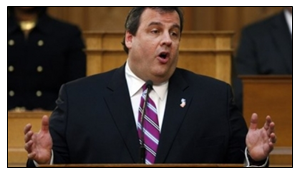By Kevin Mooney
What happens when you offer up a death wish aimed at the governor of New Jersey?
The answer is you receive a standing ovation from hundreds teachers union members who are accustomed to lavish benefit packages and compliant elected officials who roll over each year at the expense of taxpayers.
In an effort to close an $11 billion budget gap he inherited from the previous administration, Gov. Chris Christie moved forcefully to cut spending while avoiding tax hikes. This put him at odds with the New Jersey Education Association (NJEA), which lobbies Trenton each year for substantial budget increases.
For starters, Christie asked teachers to accept a one year pay freeze and to pay 1.5 percent of their salary toward health insurance premiums. Until now, they have not been asked to make any insurance contributions. At a time when millions of Americans working in the private sector are either losing their jobs or are denied increased wages, it would not be unreasonable to view the governor’s actions as restrained, moderate and necessary. In fact, a Rasmussen telephone survey of New Jersey voters last year showed that over half of the voters in heavily the Democratic state ardently support the Republican governor’s budgetary actions.
But the NJEA, true to form, bitterly denounced Christie and accused him of undermining the state’s education system.
“Gov. Christie’s attitude toward public education is clear,” NJEA President Barbara Keshishian declared last September as the governor unveiled budgetary reforms. “He has spent his entire term as governor defunding public schools and demonizing the people who work in them. It is time to bring educators to the table for a meaningful discussion of how to help our lowest performing schools improve without damaging our many excellent, high-performing schools.”
That “meaningful discussion” was short-circuited just a few months into Christie’s administration when Joe Coppola, the Bergen County Education Association (BCEA) president, signed off on a memo packaged as a prayer that took aim against Christie’s well-being.
The memo appeared on the Facebook page of “New Jersey Teachers Against Chris Christie’s Pay Freeze” and read as follows: “Dear Lord: This year you have taken away my favorite actor, Patrick Swayze, my favorite actress, Farrah Fawcett, my favorite singer, Michael Jackson, and my favorite salesman, Billy Mays… I just wanted to let you know that Chris Christie is my favorite governor.”
Keshishian apologized for the memo and said it was “not funny.” She added, “[L]anguage such as that has no place in civil discourse.” When she called the governor’s office to make amends, Christie invited her to appear in person; it’s a short walk from the NJEA’s Trenton office to the Statehouse. Christie described the encounter during his address to the Goldwater Institute in Arizona.
The meeting ended abruptly when Keshishian declined to fire Coppola. Where his predecessors have been cowed, Christie has been forceful. Prior to becoming governor, Christie served as the U.S. attorney for New Jersey where he organized successful prosecutions against officials in both parties on corruption charges. He is not the habit of backing down. But a fundamental shift in the makeup and composition of organized labor that first became apparent in 2009, has also worked to his political advantage.
For the first time in American history, more union members worked for the government than for the private sector (51.8 percent), a trend that continued through 2010, according to the U.S Department of Labor’s Bureau of Labor Statistics. This shift has occurred in tandem with an overall drop in union membership that affects mostly the private sector. After losing over 600,000 members last year, organized labor now accounts for just 11.9 percent of all employees.
“While the traditional face of the union movement is workers on the assembly line, this stereotype no longer matches reality,” James Sherk, a labor policy analyst with the Heritage Foundation explained in an interview. Almost two-and-a-half times as many union members now work in the post office as in the domestic auto industry.”
The private unionization memberships rates are not just below where they were a few years ago, but are low historically. In the private sector, 93.1 percent of workers are non-union, more than when President Franklin Delano Roosevelt signed the National Labor Relations Act (NLRA) in 1935.
“We are not talking about a temporary blip, we are seeing a trend,” Sherk said. “The future is going to be with unions in government where you have no competition. They are not bargaining over how to split profits, instead they are bargaining over how much in taxpayer dollars will be spent on benefits instead of providing a service to the public. The union movement now consists primarily of government employees lobbying for more government and higher taxes. ”
With unemployment hovering near 10 percent, the public has become more attuned to a separate class of workers insulated from the financial fallout that has bedeviled their co-workers, friends and family members. While private-sector employment rolls have contracted to the point where they are nearly 7 percent smaller now than they were just three years ago, public employee rolls have grown by nearly 2 percent, government figures show. Moreover, public employees have benefitted from robust wage growth, even in the midst of a recession.
This all works to Gov. Christie’s advantage politically. The public has become attuned to the unrealistic, deficit-be damned mentality that prevails about public sector union members.
Coppola, the education association official who offered up the death wish aimed against Gov. Christie, received a standing ovation from 450 union members at a dinner banquet last year after his death wish memo was made public.
“The membership is very supportive,” Coppola said in an interview with the Bergen Record. “I go to bat for each and every one of them.”
But the public is not applauding.
For that matter, private sector union workers are not applauding.
Kevin Mooney is a contributing editor to Americans for Limited Government (ALG) News Bureau.


